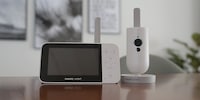

The Avent Connected baby monitor’s faultless
The high-tech version of Avent’s classic baby monitor claims to be the all-round worry-free package for (grand)parents. I put it through a long-term test to see how it fared.
With a baby monitor, I can now keep an eye on my grandchild’s sleep without having to constantly run into their nursery. Devices like this are convenient because I can do the washing up or just relax on the sofa while still knowing what my granddaughter’s doing.
I received the Connected baby monitor from Avent and tested it thoroughly. As the name suggests, You can use the camera both at home and on the go. So, if you’ve left your child with a babysitter, you can still keep an eye on everything using the corresponding app.
Unboxing and assembly
The box contains the «parent unit» and the «baby unit» – each with a power supply, a quick start guide, a rod and a clamp.
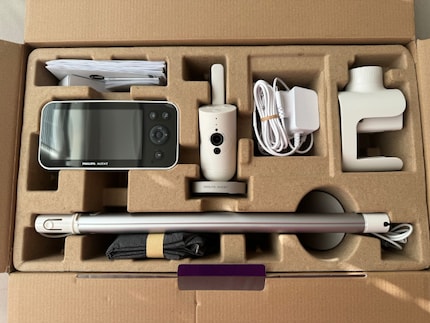
Assembling the parts is self-explanatory, even without looking at the instructions provided. Use the clamp as a base, insert the rod into it and attach the baby unit, which you can rotate to best align the camera. This allows you to attach the camera to the cot.
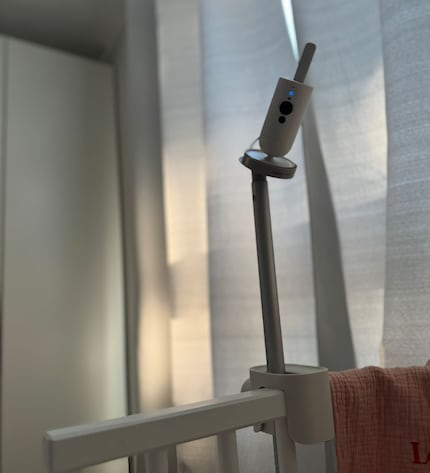
Avent’s drilling template’s also handy if you want to mount the camera on the wall. Alternatively, you could just put it on a table. These options allow you to be flexible, especially if you take the monitor on holiday.
The camera unit needs to be plugged in, as it’s continuously mains-powered. The parent unit has a rechargeable battery, so you can set it up wherever you want and carry it around the house or flat.
In short, everything seems solid and high-quality.
Smooth setup
Once everything’s assembled and plugged in, I start setup. To do this, you briefly press the button on the baby unit and then turn on the parent unit. It automatically searches for the camera. This only takes a few seconds and works flawlessly for me.
Avent states that the range between the two units is 50 metres indoors and up to 400 metres outdoors. As always, these figures shouldn’t be taken at face value, as huge steel beams in ceilings, very thick doors or multiple partition walls weaken the signal.
If the parent unit loses its connection to the camera, a range warning appears and the device issues both an audible and visual alert. However, I can’t manage a distance of 50 metres in my apartment. After all, I don’t live in a mansion.
I set up my long-term test as follows: the camera’s in the guest room, and I take the parent unit out onto the balcony. Between them, there’s a distance of almost 17 metres, two closed room doors and one balcony door that’s ajar. The connection remains stable, and the image is clear. The sound seems slightly delayed, but I don’t consider that a problem.
Amazing image quality
The baby unit’s camera offers Full HD resolution. The parent unit displays the image on a five-inch colour LCD screen with 1280 × 720 pixels. The image is razor-sharp, exceeding my expectations both in daylight and during the night. Besides the camera image, the monitor also tells you the current temperature of its location.
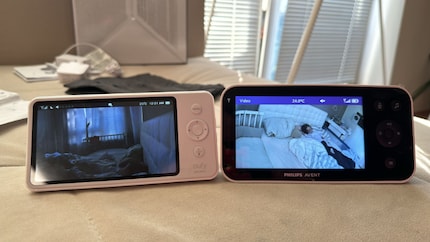
The recording’s so detailed that I can pick up even the smallest movements. This is reassuring, but it’s also important for another feature. More on that shortly.
The basic features cover all the bases
The baby monitor is bidirectional. This means you see and hear what’s happening in the baby’s cot and you can also transmit your voice to the nursery. If a child’s sleep is unsettled, it often helps if Mum or Dad talks to them or sings them a little song.
Speaking of songs, the baby unit can play built-in lullabies, nature sounds or even gentle (white) noise. I can also turn on a small night light on the camera and adjust the brightness on the parent unit so my granddaughter’s not in total darkness.
And since children like to struggle free of their blanket while sleeping, you get an alert if the temperature in the room’s below or above set values.
Modes and sensitivity
There are three modes to choose from on the parent unit:
- Video mode: as the name suggests, the parent unit continuously receives the camera’s video signal, so the screen’s permanently active. I was a bit confused at first because I sometimes felt like I was only seeing the image but not hearing any sound. A quick look at the instructions clarified this. If you want to see your child and also receive continuous sound, you have to set the baby unit’s sensitivity to the highest level.
- Audio mode: pretty self-explanatory, right? If you activate this mode, the display on the parent unit stays dark.
- Eco mode: in eco mode, the monitor turns off the picture and sound when the baby unit’s sensitivity threshold is exceeded. So, if «everything’s OK», you won’t see or hear anything.
Setting the sensitivity requires some experimentation. My tip: start by choosing the highest setting and see whether the notifications come in too frequently. If the child’s sleeping peacefully but the image appears because of another noise, I set the sensitivity a bit lower.
Setting up the app
Avent offers a complementary app for the baby monitor in the Apple and Google app stores. You need this app for the two features I’ll introduce to you at the end of this article. Once the app’s downloaded, it guides you step by step through the setup process. You can’t go wrong.
First, you have to set up an Avent account with an e-mail address where you’ll receive a confirmation code. Then you enter your Wi-Fi login details and scan the app-generated QR code with the baby unit. It’s all done in around two minutes.
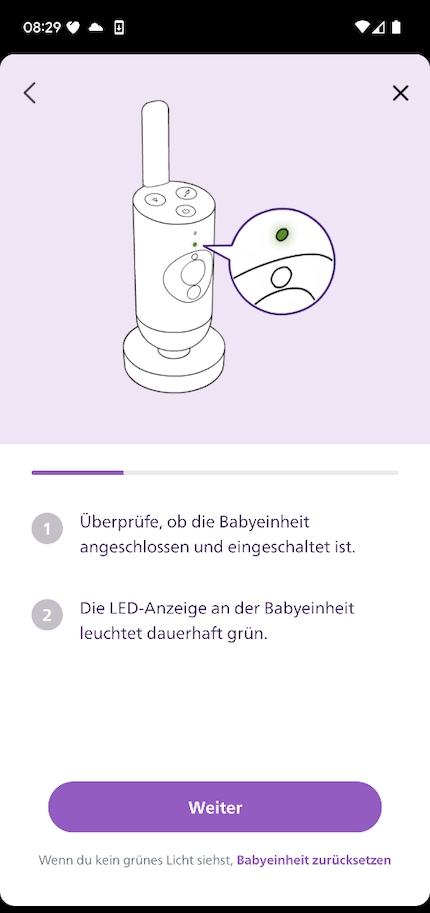
Pairing means I can now use my phone as the parent unit, even when I’m out. I can invite other people via the app, who can then also use the monitor. However, alarm, notifications and device control options are reserved for admin accounts directly linked to the baby unit.
The app also includes statistical features including a sleep diary. You can use the two features below for free for three months with an Avent account. If you want to continue using them after that, it’ll cost around 5 euros per month. The free trial ends automatically.
Monitoring and understanding sleep
So, back to image quality: the camera displays an image to reassure parents but also interprets breathing rate and sleep status. Avent calls it SenseIQ. I find this sleep monitoring useful. If the device (or the app) indicates «light sleep», it’s better if I don’t step on the creaky plank of my laminate floor right outside the nursery. And since sleep quality and duration are tracked and entered into a digital sleep diary in the app, parents can better understand their child’s rhythm.
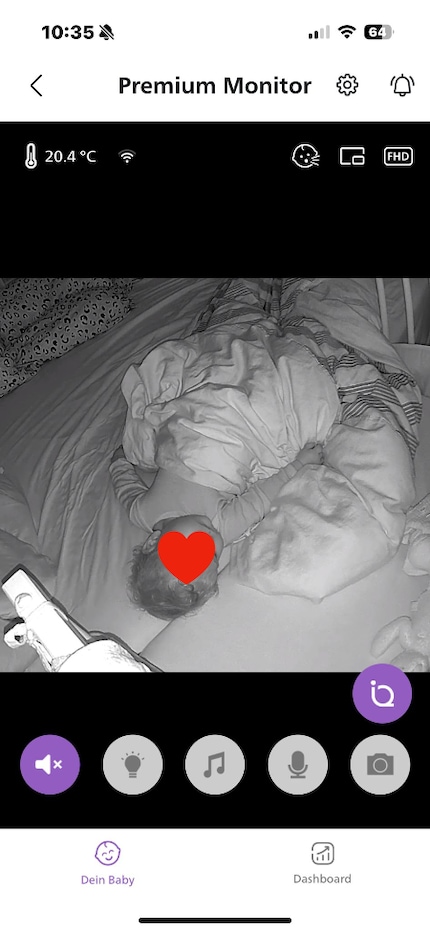
Breathing monitoring can reassure parents who want to be sure their baby’s doing well. Because breathing detection works without external body sensors, the monitor isn’t a medical device. The baby monitor can’t and shouldn’t replace medical advice and supervision if the baby has a medical condition that requires close monitoring. The feature doesn’t sound an alarm if breathing stops.
AI detects what your baby needs
The optional child need detection’s a special feature of the Connected baby monitor. The technology behind it was developed by Zoundream. AI analyses the sounds picked up by the microphone and interprets them. If your baby cries, the app tells you what the underlying need is, such as hunger, a dirty nappy or being held.
The product description states that this feature’s intended for babies up to 12 months old and works best up to six months of age. Because my granddaughter’s already too old for it, my friend Lena tried it out with her little daughter.
After initial scepticism, Lena’s now enthusiastic and has taken on the role of unofficial Avent brand ambassador among her friends. «The detection works really well, and I especially recommend the monitor to anyone who’s expecting their first baby and still a bit inexperienced.»
Lena says technology doesn’t replace maternal experience and instincts, but it complements them. «I gained experience with my first child. But back then, I would’ve liked to have had this kind of support. You’re still completely unsure what the baby needs. And it can be a great help, especially for someone else when Mum isn’t there.»
So, is the investment worth it? «Definitely. I’d still have bought it even if it’d been more expensive.»
The verdict couldn’t be more positive. We’re both wowed.
In a nutshell
The Avent Connected baby monitor covers all bases
Pro
- Excellent image and sound quality
- Easy to use
- Sense IQ and Cry Assist technology
Contra
- Limited cry detection with the free version

Hamburg local, bookworm, and ice hockey fan. Dad and granddad. Constantly tinkering around with my smart home setup. I love DIY, the outdoors, fashion, and cosmetics.
